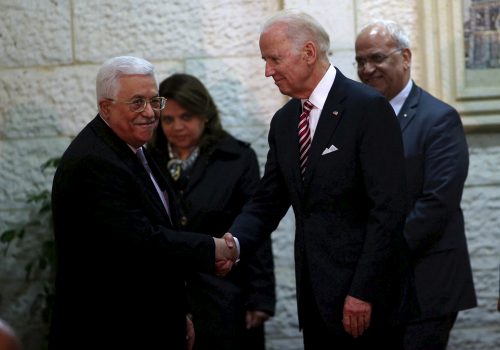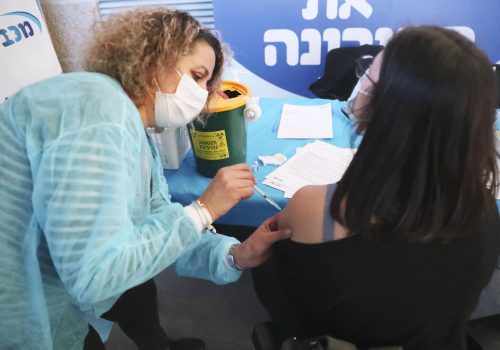It’s been one year since the Abraham Accords. Gulf-Israel ties are still far from normal.
One year after former President Donald Trump coaxed the United Arab Emirates (UAE) and Israel to normalize relations, ties between the two countries and other signatories to the Abraham Accords—Bahrain, Morocco, and Sudan—have a distance to go before they can be considered an enduring success.
While the general direction of engagement remains positive, even such obstacles as the eleven-day war with Hamas in the Gaza Strip in May and maritime confrontations with Iran haven’t derailed the latest Middle East peace train. The engines may have slowed somewhat, but little of the acrimony evident in Israel’s decades-old partnerships with Egypt, Jordan, and the Palestinian Authority has emerged.
The epic changes from last year’s political landscape, though, have replaced some of the excitement with questions. Gone from the world stage is Trump, who proudly counted the accords as a signature achievement before he lost the 2020 presidential election. Former Israeli Prime Minister Benjamin Netanyahu also got bounced by voters and was surprised to find himself unwelcome in the UAE while still in office. Partly because of COVID-19 and partly because President Joe Biden is wary of his predecessor’s legacy, the exuberance with which Gulf-Israel rapprochement was unveiled in 2020 has yielded to more sober assessments on how to proceed. For example, Israel’s new Prime Minister Naftali Bennett plans to visit the White House in coming weeks. Will he be invited to Abu Dhabi anytime soon? And when will Israel welcome the UAE’s powerful Crown Prince Mohammed bin Zayed to Jerusalem?
What has developed since August 13, 2020 has been transformative, but the tone has changed. The surprise Oval Office announcement last year, along with the subsequent agreements with Arab states, were the first real breakthroughs in regional peacemaking since the Jordan-Israel treaty a quarter-century before. The UAE and Israel have since exchanged ambassadors and opened modest embassies in Abu Dhabi and Tel Aviv. Israeli Foreign Minister Yair Lapid flew to Morocco on August 11 in the highest-ranking diplomatic contact between the two countries yet. The initial enthusiasm over the Abraham Accords produced a whirlwind of visits by government, business, cultural, and religious leaders, while briefly packing Dubai hotels with Israeli tourists. Pandemic restrictions have since curbed direct flights and reduced the level of activity.
Now that barriers have been broken and relationships have been kindled, the five signatories and the US must focus on how to flesh out the promise of the accords. The Biden administration must figure out how to support the normalization campaign despite its Trumpian origins or it could die. Those ballyhooed memorandums of understanding (MOUs) that were signed by CEOs, financiers, hospital chiefs, and university presidents won’t be fully consummated without green lights from the political leadership.
The signs that Arab-Israeli engagement was more popular in Jerusalem than in the Gulf were clear from the beginning. Just the term “normalization” is a usefully vague diplomatic term that can mean virtually anything and be halted with minimal fuss. Were the four Arab countries making peace with Israel? Not quite. More like an MOU that projects good intentions but has limited staying power. Add to that the breach of protocol and awkward tableau at the September 15 signing ceremony for the Abraham Accords on the South Lawn of the White House. There stood President Trump and Prime Minister Netanyahu, as their counterparts Crown Prince Bin Zayed and Bahrain’s King Hamad bin Isa Al Khalifa found reasons to stay home, sending foreign ministers in their stead.
Also missing from the process was a pragmatic vision of how the Palestinian issue could be advanced as part of the accords. The US, Israeli, Emirati, and Bahraini leaders seemed to agree that the Palestinian issue could be finessed with lip service. The UAE, in fact, presented the agreement at home as primarily a means of preventing Israel from annexing the West Bank, and only second as a break with the longstanding Arab taboo on engaging in open relations with Israel. While PA President Mahmoud Abbas called the Abraham Accords a stab in the back, Palestinians largely swallowed their rage until last May when riots broke out in East Jerusalem and cities across Israel. That was followed by more than four thousand rockets fired at Israel from the Gaza Strip and Israeli airstrikes against the Palestinian territory. The fighting left some 260 dead in Gaza and thirteen in Israel. The eruption of violence didn’t damage the foundations of the accords, but it put a damper on enthusiasm for relations with Israel and returned the Palestinian issue to the front page.
The Emiratis also signaled their disappointment when the incoming Biden administration suspended the $23 billion arms sale that reportedly clinched the Trump deal with fifty F-35 stealth fighter jets and eighteen MQ–9B Reaper drones. In April, the Pentagon announced that the sale would go through, but the temporary postponement was an early expression of White House discomfort with the Republican-brokered diplomatic package. State Department officials remain chilly when talking about the accords and prefer to use the nomenclature of normalization. In fact, Trump’s son-in-law and Middle East envoy Jared Kushner is seeking to retain some measure of ownership over the brand by establishing the Abraham Accords Institute for Peace to promote trade and people-to-people activities between Israel and Arab countries. However, the organization hasn’t held any public activities or put up a website.
Other road bumps since last year include mounting opposition to a deal that would enable the UAE to use a trans-Israel pipeline as a shortcut from the Red Sea in exporting oil to the Mediterranean and markets in Europe and North America. Israeli environmental groups have targeted the project as a threat to the sensitive coral reefs in the Gulf of Aqaba and surrounding beaches in Israel, Jordan, Egypt, and Saudi Arabia. They point to the threat of spills like the 2014 disaster when the pipeline burst and 1.3 million gallons of crude oil poisoned an Arava desert nature preserve.
The series of attacks on Israeli-owned ships traveling through the Persian Gulf that have been attributed to Iran, along with assaults on Iranian vessels suspected to have been carried out by Israel, have shown that enemies of the accords won’t sit back as normalization gathers momentum.
Still, the first year since the agreements were announced has been extraordinary to witness. While Israel and the Arab Gulf states had cultivated discreet trade and intelligence ties for years, the accords brought those ties into the daylight. Suddenly, the chief executive of Israel’s biggest lender, Bank Hapoalim, was signing agreements in the UAE, and Dubai Diamond Exchange Chairman Ahmed Bin Sulayem was ambling around Tel Aviv and opening an office in the Israel Diamond Exchange. Dubai’s DP World joined with an Israeli partner to bid for ownership of Israel’s Haifa Port, one of Israel’s main Mediterranean Sea terminals. An Emirati sheikh with links to the royal family even sought to buy Israel’s Premier League Beitar Jerusalem soccer club before an examination of his dubious finances killed the deal.
Then you have the emergence of Dubai’s secret synagogue and the spectacle of hundreds of Jews in December dancing around a giant menorah to celebrate the Hanukkah holiday at the foot of the Burj Khalifa, the tallest skyscraper in the world. Suddenly kosher restaurants were opening in Dubai. A catering company was established to provide kosher in-flight meals for Emirates airline. In Abu Dhabi, the government is building a monumental prayer compound known as the Abrahamic Family House that will include a mosque, a church, and a synagogue. On the horizon in October is the Dubai Expo, where Israel will host a pavilion on Arab soil alongside 190 other participating nations.
These developments may look like the dawn of a new Middle East, but they can easily unravel. It may be an escalated conflict between Israel and Iran or with its Lebanese proxy Hezbollah. Saudi Arabia could back away from its tacit support for the accords and the Palestinians might unify and stage another full-scale intifada uprising that galvanizes the Arab world against Israel. Under a multitude of scenarios, the normalization process is vulnerable.
A year after the UAE and Israel came together with some Trumpian razzle-dazzle and billion-dollar weapons deals, the US and its allies have an opportunity to build on the Abraham Accords. With business, technology, defense, environmental, and political support coupled with efforts to encourage dialogue between the people involved, the pursuit of normal relations between Arab nations and Israel—even peace treaties—may be within reach.
Jonathan H. Ferziger is a non-resident senior fellow at the Atlantic Council and a former Middle East correspondent for Bloomberg News.
Image: Israeli alternate Prime Minister and Foreign Minister Yair Lapid speaks during a news conference in Dubai, United Arab Emirates, June 30, 2021. REUTERS/Christopher Pike


